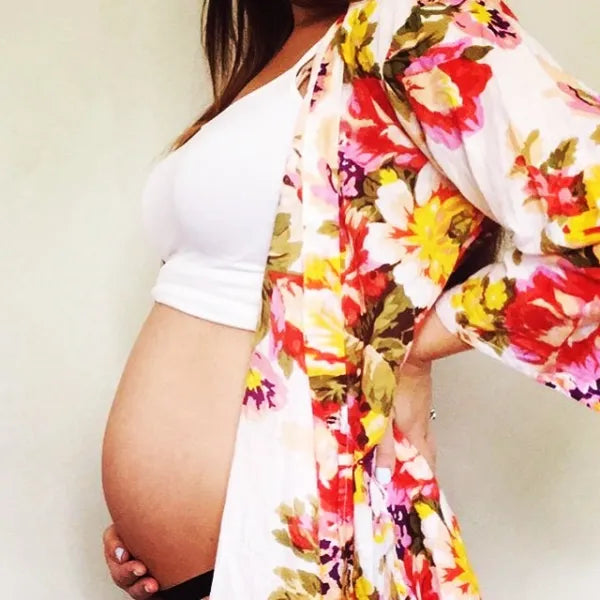Am I At Risk Of Miscarriage?

It’s a common concern among most women during early pregnancy, so let’s take a look at the facts and help put your mind at ease.
WHAT IS A MISCARRIAGE?
It’s the spontaneous loss of a pregnancy that occurs before the baby reaches 20 weeks gestation. After 20 weeks a baby is then considered “viable” which means that he or she is developed enough that it would be possible, if born at this stage to survive with the assistance of specialist medical care.
The loss of a baby post 20 weeks is known as a stillbirth.
WHAT CAUSES A MISCARRIAGE?
It’s estimated that around 25% of all pregnancies in Australia result in a miscarriage! Most of these happen within the first trimester (first twelve weeks of pregnancy).
Being aware of what can cause a miscarriage, symptoms to look out for and what the procedures are involved with a miscarriage, can help to feel more informed and in control should this happen to you.
TYPE OF MISCARRIAGES
There are 2 types of miscarriages; Inevitable and Missed.
With an inevitable miscarriage, the cervix begins to open up before the baby is viable. Once this happens it is unlikely that the pregnancy can be saved.
A missed miscarriage occurs when the embryo or fetus stops developing but remains inside the uterus. The baby passes away without any clear warning signs for the mother that something was wrong.
WHAT ARE THE CAUSES & RISK FACTORS
Around 80% of miscarriages take place within the first 12 weeks of pregnancy and occur because there is a chromosomal irregularity with the developing fetus.
The baby may have too many or not enough chromosomes, which means there is incomplete chromosomal information and the baby is unable to develop properly.
A miscarriage that happens in the second trimester, is more likely to have had another trigger is often the result of an underlying health problem. There are several other possible causes for a late miscarriage:
- A structural problem with your uterus
- Your maternal age – greater risk over the age of 35
- If you develop an infection
- If you have a weakened cervix
- An immunological or endocrine disorder in the mother
- A pre-existing condition that increases the risk of miscarriage such as PCOS, diabetes or thyroid disease
- Lifestyle – such as recreational drug use, obesity, smoking, drinking alcohol and too much caffeine
INVESTIGATING MISCARRIAGES
For most women each miscarriage can be very distressing, however some comfort can be found in the knowledge that most couples can go on to have healthy pregnancies in the future.
Around 1 in 100 couples will experience recurrent miscarriages, which means 3 or more consecutive losses.
If this happens to you, it’s likely that you will be offered testing to try and establish a cause.
Sometimes no cause can be found and the miscarriages will remain unexplained.
LIFE AFTER A MISCARRIAGE
It’s important to allow yourself and your partner the time to grieve and recover.
You may feel like you are not ready both emotionally and physically for some time to start trying again, however, some couples will want to try again immediately.
If you are undergoing tests or treatments, if there is bleeding or complications, you may be limited to when you can safely start trying again. It’s important to give your body time to heal and reset and listen to the recommendations of your healthcare providers.
This may also be a good opportunity to review your lifestyle to help maximise your chances of a healthy pregnancy in the future.
COPING WITH PREGNANCY LOSS
There are many emotions associated with grieving the loss of your baby, you may feel some, all or none of these at different times.
Throughout your grieving the most important thing to do is to express how you are feeling through words and actions.
Some options you may like to consider are;
- Try writing a letter to your baby. Tell them how loved they were and what you had hoped for them. Keep it aside somewhere safe.
- Keep a daily journal – Often by writing down your thoughts and feelings you can help to formalise and organise them. This can help you feel more in control and if need be read back over them to realise how far you have come in your grieving process.
- Communicate with your partner- Just as you created your baby together, facing the loss of your baby together can help you both cope with the difficult emotions miscarriage raises. It’s really important not to shut each other out. Try give each other room to express how you are feeling.
- Plant a tree – You might like to plant a tree in the garden or in a special pot that is dedicated to your baby.
- Join a support group – Often it’s hard for our family and friends to fully understand what we are going through. Support groups are a great way to share your thoughts feelings, questions with other couples who truly understand. They can be a great resource to reassure you that you’re not alone.
MaterniTea's Range of Fertility and Pregnancy Tea blends have been professionally developed to help support a healthy pregnancy. Our ACTIVITEA blend is a wonderfully nourishing, immune boosting, free radical fighting and antioxidant rich blend that we encourage you to enjoy right throughout your pregnancy journey from conception to birth.
100% organic, caffeine free and available in convenient pyramid tea bags.






